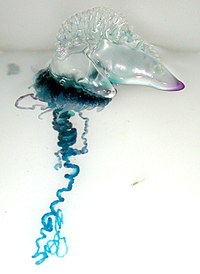
Photo from wikipedia
CCAAT/Enhancer Binding Protein β (C/EBPβ) is a basic leucine zipper (bZIP) transcription factor that causes aberrant gene expression in many cancers. Upregulated or overactivated C/EBPβ drives oncogenesis by promoting tumor… Click to show full abstract
CCAAT/Enhancer Binding Protein β (C/EBPβ) is a basic leucine zipper (bZIP) transcription factor that causes aberrant gene expression in many cancers. Upregulated or overactivated C/EBPβ drives oncogenesis by promoting tumor survival and proliferation and is a critical regulator of the immunosuppressive tumor microenvironment (TME). Specifically, C/EBPβ regulates macrophage differentiation, activating a transcriptional program driving macrophage polarization toward immunosuppressive M2-type myeloid-derived suppressor cells (MDSCs). Consistently, activation of C/EBPβ correlates with poor prognosis in several types of human cancer. Thus, targeting C/EBPβ to reprogram tumor-associated macrophages (TAMs) from the M2 toward the immune-promoting M1 phenotype represents an attractive strategy to enhance antitumor immunity. ST101 is a novel peptide antagonist of C/EBPβ dimerization that inhibits C/EBPβ-dependent gene expression. Here we evaluated the impact of ST101 on macrophage differentiation, cytotoxic T-cell activation, and in vivo anti-tumor activity. Primary human macrophages cultured from Peripheral Blood Mononuclear Cells (hPBMCs) were activated toward the M1 or M2 phenotype by LPS and IFNγ or IL-4, respectively. ST101 exposure dose-dependently suppressed expression of M2 markers (CD163, CD206) while inducing M1 markers (CD80, CD86) by flow cytometry and quantitative PCR, resulting in a 40-fold increase in the M1/M2 ratio without substantial impact on cell viability. Next, in co-cultures of T cells with M2 macrophage, ST101 exposure resulted in a 4-fold increase in T-cell activation compared to control M2/T cell co-cultures, as measured by intracellular IFN-γ staining. Importantly, ST101 did not suppress proliferation or activity of T cells cultured alone. Finally, in an orthotopic TNBC model in vivo, ST101 in combination with anti-PD-1 treatment enhanced anti-tumor activity compared to either single agent alone. The observed increase in tumor growth inhibition was accompanied by a reduced TAM fraction and increased intratumoral and peripheral M1/M2 ratios. ST101 is being evaluated in a Phase 1-2 clinical study in patients with advanced unresectable and metastatic solid tumors (NCT04478279). Initial gene expression analysis performed on 8 paired patient biopsies (prior to ST101 exposure and within 24 hrs of ST101 administration during cycle 2 of therapy) collected during dose escalation (4 mg/kg ST101 or greater) indicates a significant decrease in expression of multiple factors involved in M2 polarization, including CD209, SIGLEC5 and IL-24, and T cell suppression, including FoxP3 and inhibitory KIR proteins. The result is a decrease in intratumoral regulatory T cell (Treg) vs. TIL ratio, indicating a shift towards a more immunoactive TME. Overall, these results support a novel, macrophage-driven mechanism of action for ST101 as anticancer agent and suggest the exploration of ST101 in immune-oncology therapeutic strategies. Citation Format: Claudio Scuoppo, Rick Ramirez, Siok Leong, Lila Ghamsari, Gina Capiaux, Rob Michel, Steve Kaesshaefer, Gene Merutka, Barry Kappel, Abi Vainstein-Haras, Alice Bexon, Jim Rotolo. ST101, a peptide antagonist of novel I/O target CEBPβ,reprograms MDSCs and promotes an immunoactive tumor microenvironment [abstract]. In: Proceedings of the American Association for Cancer Research Annual Meeting 2023; Part 2 (Clinical Trials and Late-Breaking Research); 2023 Apr 14-19; Orlando, FL. Philadelphia (PA): AACR; Cancer Res 2023;83(8_Suppl):Abstract nr LB236.
Journal Title: Cancer Research
Year Published: 2023
Link to full text (if available)
Share on Social Media: Sign Up to like & get
recommendations!